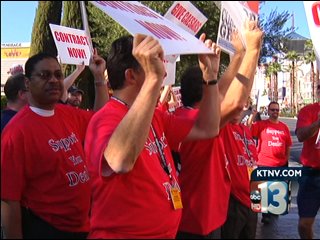It was inevitable that this Lake Tahoe marine disaster would go viral. Besides, as an S&G reader astutely pointed out, the sinking of the Sierra Rose makes a tidy metaphor for Nevada‘s economy: a top-heavy S.S. McMansion now half-underwater due to a lack of structural integrity. Think of it as Fontainebleau in ship form.
Considering that the Sierra Rose was lumbered with questionable accoutrements like granite fireplaces and a helipad (despite being only 86 feet from stem to stern), its owners are darned fortunate that this $3.2 million “town home on a barge” didn’t capsize outright. Had the evidently fragile hull been rent asunder while out on Lake Tahoe, we’d be talking serious loss of life. With any luck this seagoing eyesore will, like some of Vegas’ worst failsinos, be sent to the scrapyard. Patching it up and putting her back onto the lake is an invitation to catastrophe.
 Theatrical business took me last night to the Las Vegas Hotel & Casino, where I surveyed the damage wrought by ex-owner Colony Capital and current one Goldman Sachs. Rarely have I set foot on such a sad, pathetic and lonesome gaming floor — especially at an ostensibly major casino. The slot and table-game inventory has been decimated and a high-limit slot room was out of action, storing unused furniture. All of the architectural elements of the SpaceQuest Casino are still in place — as is the logo — although there sure as hell wasn’t any gambling going on in it. Much of the main SpaceQuest floor has been converted into a very improvised-looking lounge space, although nobody was playing it yesterday evening. All the gamblers on-property could probably have been fit into old Nevada Palace with room to spare. In short, the LVH has leapfrogged far ahead of the Riviera and even Hooters Casino Hotel to become my #1 pick for Las Vegas Casino Most Likely to Go out of Business. Falling into the hands of Colony Capital Boob-in-Chief Tom Barrack is darn near to a casino’s death sentence.
Theatrical business took me last night to the Las Vegas Hotel & Casino, where I surveyed the damage wrought by ex-owner Colony Capital and current one Goldman Sachs. Rarely have I set foot on such a sad, pathetic and lonesome gaming floor — especially at an ostensibly major casino. The slot and table-game inventory has been decimated and a high-limit slot room was out of action, storing unused furniture. All of the architectural elements of the SpaceQuest Casino are still in place — as is the logo — although there sure as hell wasn’t any gambling going on in it. Much of the main SpaceQuest floor has been converted into a very improvised-looking lounge space, although nobody was playing it yesterday evening. All the gamblers on-property could probably have been fit into old Nevada Palace with room to spare. In short, the LVH has leapfrogged far ahead of the Riviera and even Hooters Casino Hotel to become my #1 pick for Las Vegas Casino Most Likely to Go out of Business. Falling into the hands of Colony Capital Boob-in-Chief Tom Barrack is darn near to a casino’s death sentence.
 Five years of grindingly slow negotiations between Caesars Palace have finally resulted in a labor accord, one in which Caesars basically takes the Transport Workers Union to the cleaners. The Las Vegas Review-Journal was backhanded by Caesars and the TWU alike, posting a perfunctory “breaking news” item this morning. The rival Sun‘s Steve Green, however, got the whole story. (Could the relentlessly anti-union positions taken by the R-J have something to do with the freeze-out? Sounds likely.) Caesars’ game plan against its dealers has been the same one it employs against Wall Street: Delay your opponent into despairing submission, then throw him a few crumbs whilst keeping the loaf for yourself.
Five years of grindingly slow negotiations between Caesars Palace have finally resulted in a labor accord, one in which Caesars basically takes the Transport Workers Union to the cleaners. The Las Vegas Review-Journal was backhanded by Caesars and the TWU alike, posting a perfunctory “breaking news” item this morning. The rival Sun‘s Steve Green, however, got the whole story. (Could the relentlessly anti-union positions taken by the R-J have something to do with the freeze-out? Sounds likely.) Caesars’ game plan against its dealers has been the same one it employs against Wall Street: Delay your opponent into despairing submission, then throw him a few crumbs whilst keeping the loaf for yourself.
True, there will be grievance procedures in place — if the contract is ratified — that should curb the practice of arbitrary and summary termination. But when TWU mouthpiece Joe  Carbon is out front spinning the pact as sending a messing that “We’re here to stay,” you know darn well he got hosed at the negotiating table. For instance, Caesars’ dealers don’t have to adopt the onerous 80 minutes on/20 minutes off ratio to which some casinos would like to go … unless all of Caesars’ Nevada properties adopt the practice. Gee, what do you think CEO/CFO/COB/President/Grand Vizier Gary Loveman is going to do? Might as well fork over those tokes right now.
Carbon is out front spinning the pact as sending a messing that “We’re here to stay,” you know darn well he got hosed at the negotiating table. For instance, Caesars’ dealers don’t have to adopt the onerous 80 minutes on/20 minutes off ratio to which some casinos would like to go … unless all of Caesars’ Nevada properties adopt the practice. Gee, what do you think CEO/CFO/COB/President/Grand Vizier Gary Loveman is going to do? Might as well fork over those tokes right now.
Another meaningless concession made by Caesars Palace President Gary Selesner is to promise not to unilaterally confiscate dealer tips. No, the casino must “demonstrate a need to do so for competitive reasons,” before negotiating terms of the TWU’s surrender. Considering that Caesars Entertainment is nearly $20 billion in debt and not even making enough to cover its debt service, I’m taking the “under” on Caesars invoking the “competitive reasons” clause. As Green points out, much of the blame falls upon Vegas dealers themselves, unlike their more-unified (and unionized) Detroit and Atlantic City counterparts. I’ve seen firsthand how quickly the can pivot from being united against a common enemy, such as Steve Wynn, to going for each others’ throats. The casino industry’s divide-and-conquer strategy towards its dealership has been a brilliant success, without question.


I must have missed something, isn’t it against the law to take some one’s tips?
An excellent question, Nelson, one of the best that’s ever been asked in this forum. The intent of the Nevada Revised Statute in question was to prohibit exactly what Steve Wynn is doing. Ex-state Sen. Donald Mello, who co-authored the bill, was adamant on that point when I discussed it with him. (State Labor Commissioner Michael Tanchek takes the opposing view that the intent behind the law is irrelevant.)
Now, the nub of the issue is the line which bars an employer from obtaining a “direct benefit” by seizing tips. Tanchek’s position is that, since Wynn didn’t pocket the money, he didn’t benefit. Mello’s stance — and that of the Wynn LV dealers — has been that Wynn Resorts benefited because it saved the company money that it might otherwise have had to spend on increasing the salaries of pit bosses and other newly juiced-in members of the tip pool.
Caesars Palace may — just may — have tripped itself up with that “competitive reasons” clause. If Il Palazzo di Cesare is made more competitive or more profitable by confiscating tips, then a direct benefit could be pretty clearly established. Besides, as we know from previous experience, cost savings at Caesars Entertainment have a habit of finding their way into top execs’ bank accounts under the guise of “incentives.”
Taking away a working persons tips does not poll well. That is the legacy Steve Wynn will leave. Forget that he transformed Vegas into the giant that it is today, that is old news. The fact that he wants the interactors with the public to subsidize the bean counters we never see is offensive. How hardcore to you have to be to try to shakedown the face of the operation to the benefit of the faceless executives…